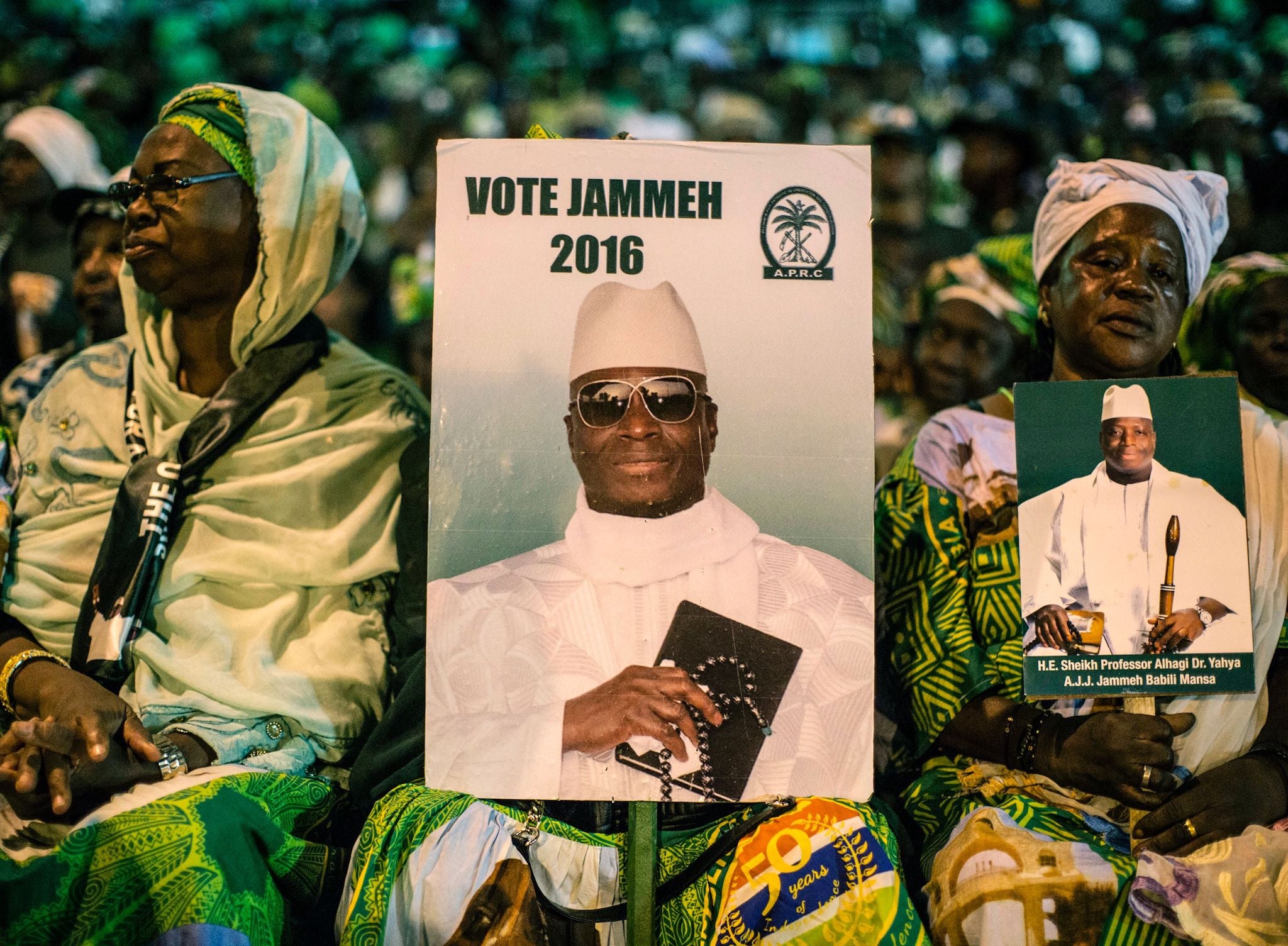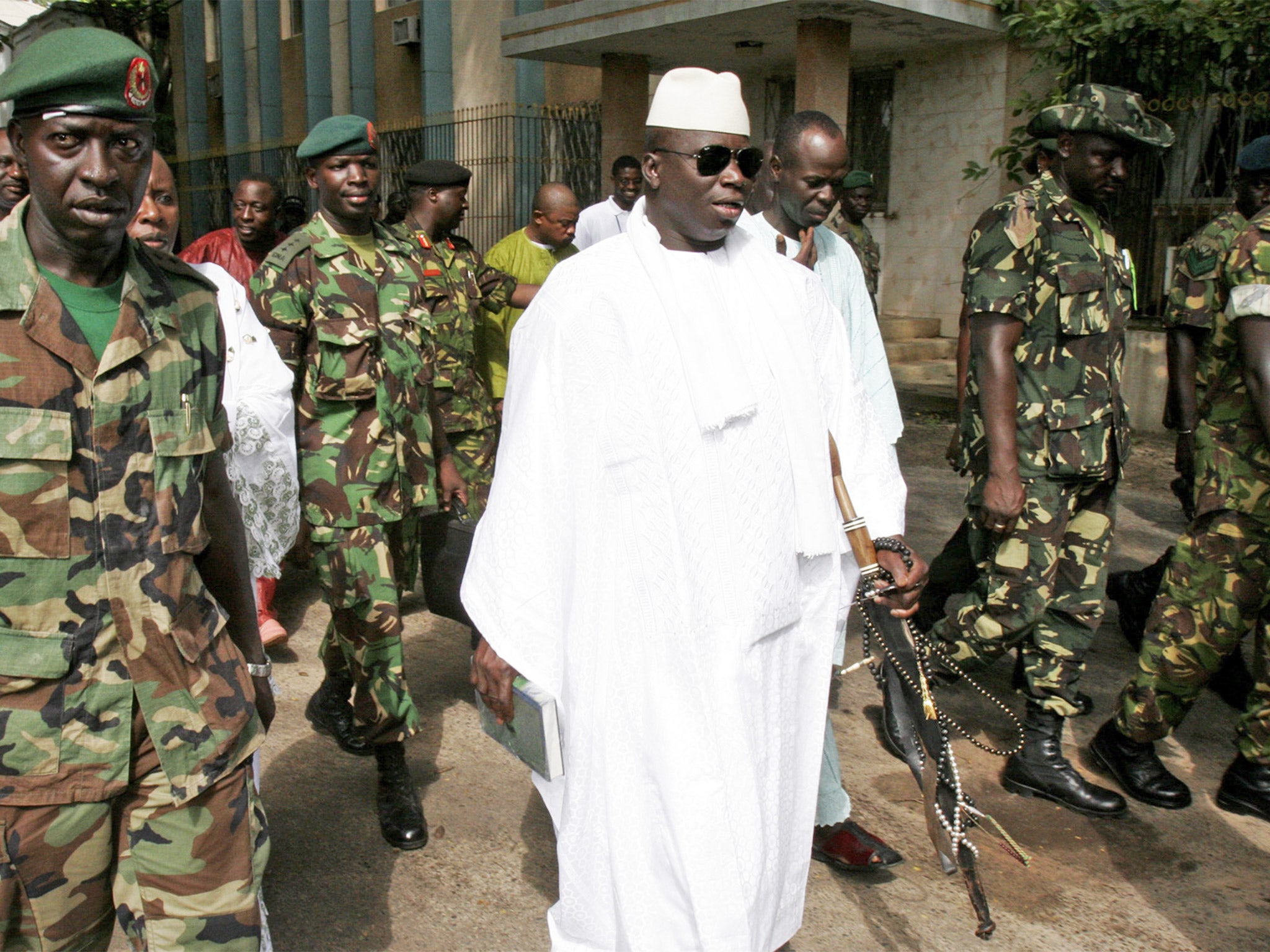Gambia election: Government shuts down internet as President Yahya Jammeh faces threat to 22-year rule
Eight opposition parties have united around one candidate in calling for regime change

Your support helps us to tell the story
From reproductive rights to climate change to Big Tech, The Independent is on the ground when the story is developing. Whether it's investigating the financials of Elon Musk's pro-Trump PAC or producing our latest documentary, 'The A Word', which shines a light on the American women fighting for reproductive rights, we know how important it is to parse out the facts from the messaging.
At such a critical moment in US history, we need reporters on the ground. Your donation allows us to keep sending journalists to speak to both sides of the story.
The Independent is trusted by Americans across the entire political spectrum. And unlike many other quality news outlets, we choose not to lock Americans out of our reporting and analysis with paywalls. We believe quality journalism should be available to everyone, paid for by those who can afford it.
Your support makes all the difference.Gambia has shut down the internet and blocked all international phone calls as the nation goes to the polls for its presidential elections.
Analysts say there is a chance the people of the small west African nation will vote out the regime of President Yahya Jammeh, who came to power in a military coup in 1994 and later amended the constitution to remove presidential term limits.
Up against Mr Jammeh is the former London security guard Adama Barrow, who is supported by an alliance of eight opposition parties clamouring for regime change. “He is not going to be re-elected - his era is finished,” Mr Barrow said on Thursday.
But the sitting government has not made things easy. Phone and internet services to the country’s 1.9 million people were cut in the hours before polling stations opened, in an apparent bid to prevent the unified opposition from mobilising - though officials said it was to reduce the risk of unrest.

In a Human Rights Watch report released last month, activists said Mr Jammeh had used state resources and dominated state media to ensure a political advantage in the election, while authorities “threatened, arbitrarily arrested, jailed, and tortured members of opposition political parties”.
The report said that from April to November, more than 90 opposition activists were arrested for participating in peaceful protests, 30 of whom were sentenced to three-year prison terms. It added that two opposition activists have died in custody.
Such activities had “all but extinguish[ed] hopes for a fair election,” said Babatunde Olugboji, deputy program director at Human Rights Watch.
Mr Jammeh and the Gambian government - who did not respond to the Human Rights Watch report - have denied all similar allegations in the past.
As the polls opened on Thursday, voters made their choice by placing marbles into green, silver or purple drums. The third option in the election was former ruling party deputy Mama Kandeh of the Gambia Democratic Congress, the only opposition party not in the coalition.
The African Union has sent a handful of observers to the country, but not nearly enough to oversee a representative sample of stations from across the country. There were no observers present from the EU or the West African regional bloc Ecowas.
The President remains the favourite to win, and has himself said that his victory is all but assured by divine intervention.
“This will be the biggest landslide in the history of the country,” Mr Jammeh said after voting with his wife in the capital.
He was met with cheers as he walked toward his car and refused to comment when asked whether he would concede in the event of defeat.
Either way, he has vowed not to allow any protests when the result is announced. He described public demonstrations as “loopholes that are used to destabilise African governments”.
Omar Amadou Jallow, leader of the coalition member the People's Progressive Party, said he believed the opposition could still win despite the clampdown.
“For 22 years we have realised that Gambia has been turned into a prison; the arrests, the detentions, the torture, and many of our people have gone into exile ... That shows the tyranny of the regime," he said.
“We are going to give people their freedoms, their liberties. That is more important than anything else.”
But others still support the country’s long-time President, and said they cannot imagine an opposition victory. "He has built the airport, schools, medical facilities and buildings," said 50-year-old Pinta Manneh. She added: “He will be angry if he loses.”
Join our commenting forum
Join thought-provoking conversations, follow other Independent readers and see their replies
Comments